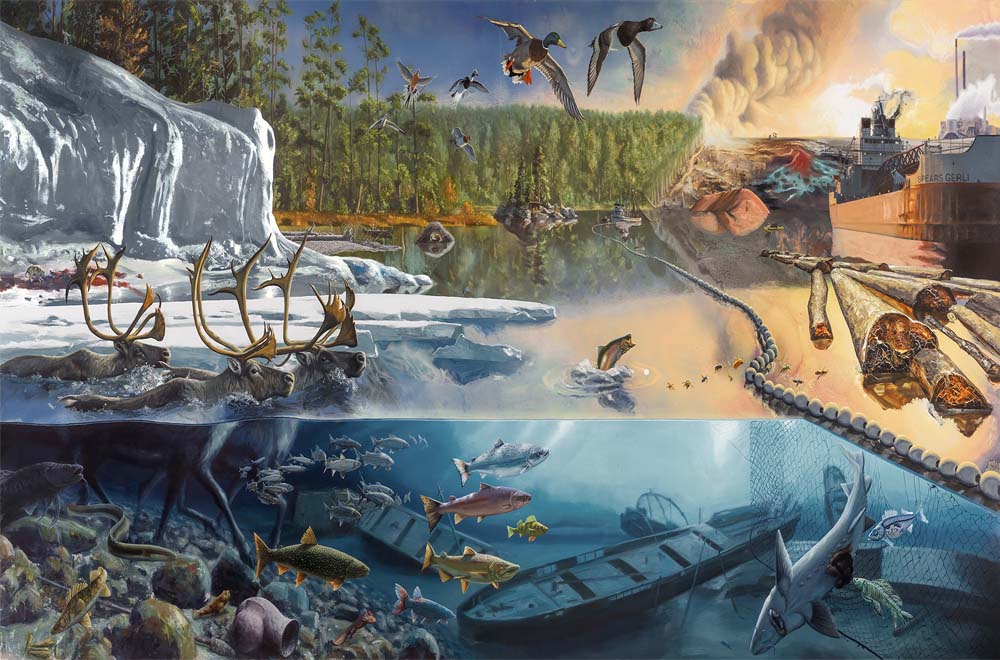Download (PDF, 5.16MB)
INTRODUCTION
Use of fossil fuels must stop! The IPCC Report
The 4,000-page report by the International Panel on Climate Change (IPCC) was not due to be released until February, 2022, but a copy was leaked to Agence France-Presse. The report calls for a total transformation of our way of life if we wish to avoid catastrophe. The window of opportunity is closing rapidly. Urgent action must be taken within less than a decade.
The Report states that “We need transformational change operating on processes and behavior at all levels: individual, communities, business, institutions and governments. We must redefine our way of life and consumption.”
Recent Extreme Weather Events
The second recent event that helped to wake us up to the seriousness of the climate emergency was a record-breaking wave of extreme heat in the western part of the United States and in south-west Canada. Unprecedented temperatures were recorded, roughly a billion tidal animals died, and many human heat-related deaths also occurred.
Extremely severe recent floods in Western Europe and in China are also thought to be linked to climate change. The north and south poles are warming at twice the rate of the remainder of the earth. Recently rain was observed for the first time on the high-altitude plateau above Greenlands inland ice sheet.
Wildfires throughout the world have also become increasingly frequent and severe.
The Threat of a Very Large-scale Famine
Unless efforts are made to stabilize and ultimately reduce global population, there is a serious threat that climate change, population growth, and the end of the fossil fuel era could combine to produce a large-scale famine by the middle of the 21st century.
As glaciers melt in the Himalayas and the Andes, depriving India, China and South America of summer water supplies; as sea levels rise, drowning fertile rice-growing regions of Southeast Asia; as droughts reduce the food production of North America and Southern Europe; as groundwater levels fall in China, India, the Middle East and the United States; and as high yield modern agriculture becomes less possible because fossil fuel inputs are lacking, there is a threat that a very large-scale famine will occur, involving billions of people, rather than millions.
Long-Term Effects of Catastrophic Climate Change
The problem of mobilizing the political will needed for effective climate action is a contrast between timescales. Effective action must be taken immediately if catastrophe is to be avoided. However, the worst effects of runaway climate change lie in the long-term future. Therefore it is difficult to mobilize the strong public opinion needed for political action. The politicians themselves, being few in number, can be bribed by the enormously wealthy fossil fuel corporations, whose profits are at stake. We should almost be grateful for the recent extreme weather events and wildfires, which have helped to make the public aware of the dangers of climate change.
Suppose that we fail in our efforts to avoid runaway climate change. What then? Then, in the long-term future, most of the earths surface will become uninhabitable, starting with tropical regions and regions that will be under water due to sea level rise. If this worst-case scenario takes place, the global population of humans will be much reduced.
Extreme Action Is Needed Immediately
It is not enough to stop subsidies to the fossil fuel industry. It is not enough to talk about future technologies for sequestering carbon. It is not enough to stop banks and pension funds from investing in giant fossil fuel corporations.
It is not enough to give more television time to climate change. All these steps are helpful, but they are not enough.
What is enough? We must very rapidly stop the extraction and use of fossil fuels. At present, U.S. President Joe Biden authorizes drilling for oil on public lands. This must stop. At present, both Canada and Venezuela produce oil from tar sands, an extremely greenhouse-gas-polluting process.
This must stop. At present, both China and India depend on coal for power. This must stop within less than ten years. Hopefully, the worst-case scenario discussed above can motivate these urgently-needed climate actions.
Links to Other Books on Global Problems
Other books and articles on global problems can be found here, here and here.
Read the entire book above or download it here.
We thank John Scales Avery, a renowned intellectual, EACPE board member, and theoretical chemist at the University of Copenhagen, for giving us permission to reproduce his latest book for EACPE.


